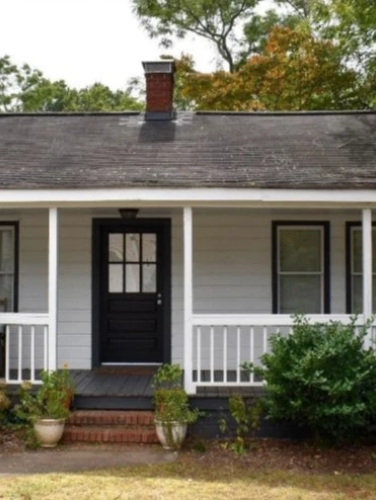
Armour Street Mill House
(ca. 1912-13)
The Armour Street Mill House was once part of the mill village constructed for the expanding Delburg Cotton Mill.
225 Armour St, Davidson, NC 28036
The Armour Street Mill House was built as part of a 1912 expansion of Davidson’s Delburg Cotton Mill. The mill opened in 1907 as Davidson’s second mill, following the successful opening of the nearby Linden Cotton Mill in 1890. The second mill also proved profitable, prompting its shareholders to plan a major expansion to double the mill’s manufacturing capacity. In anticipation of that expansion, they approved the purchase of adjacent land for the construction of a mill village to accommodate the additional workers that the expansion would necessitate. The Delburg shareholders hoped that a ready housing supply would provide a further inducement – in addition to the promise of a steady paycheck and the opportunity for an improved standard of living – to attract tenant farmers and others engaged agricultural pursuits to leave the farms and become mill operatives.
Property Quick Links
Local builder William Erasmus Potts was contracted to build six houses measuring twenty-six feet by thirty-four feet. The Armour Street Mill House was one of those six houses. The houses were built on property owned by local entrepreneur R. M. Armour who, recognizing a potential business opportunity in the close proximity of the town’s two cotton mills, had planned a suburban development he named Armour Heights. By 1919 the Delburg Cotton Mill owned twenty mill village cottages, ranging from three to six rooms, and several more under construction. The village ultimately grew to some 102 properties within a “V” shaped area formed by the town’s Watson and Sloan Streets.
In January 1921 the stockholders of the Linden Manufacturing Company and the Delburg Cotton Mill voted unanimously to merge the two companies into a new firm called the Delburg-Linden Company. The joint mills were sold two years later and renamed the Davidson Cotton Mill. Cotton-based textile production shifted to the Delburg plant while the former Linden mill was converted into an asbestos manufacturing facility. Facing financial difficulties after World War II, the small Davidson Cotton Mill was sold in 1946 to northern investors who expanded the operations and renamed the company Palomino Mills. The mill continued production for another four years before closing in 1950. As part of the termination of its business, Palomino Mills sold the mill village to Economy Homes of Winston-Salem who, in turn, sold the individual houses to the then-current residents and others interested in home ownership. William W. and Carrie Stanley Edwards purchased the Armour Street Mill House in 1951. The house has since changed hands several times. Today, both the Armour Street Mill House and the Delburg Mill represent the diversification of industry in Davidson during the peak years of cotton production in the South.
